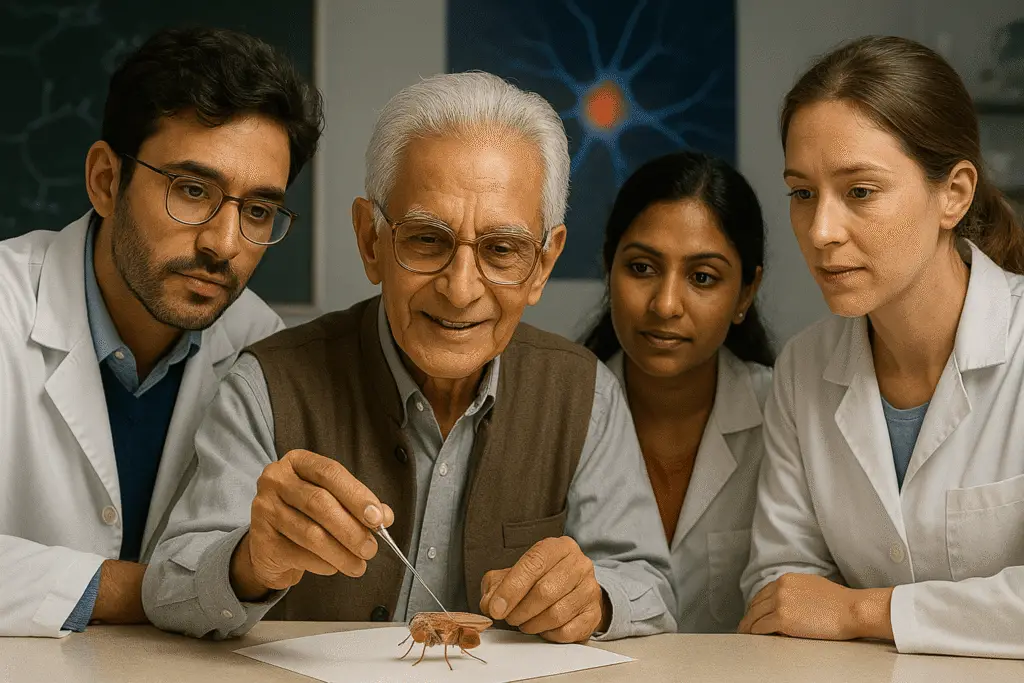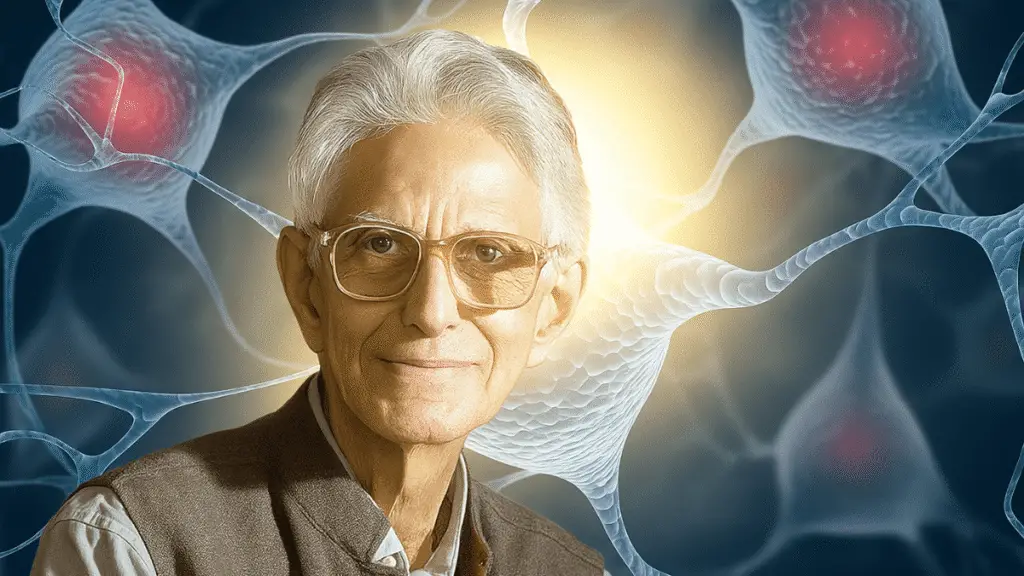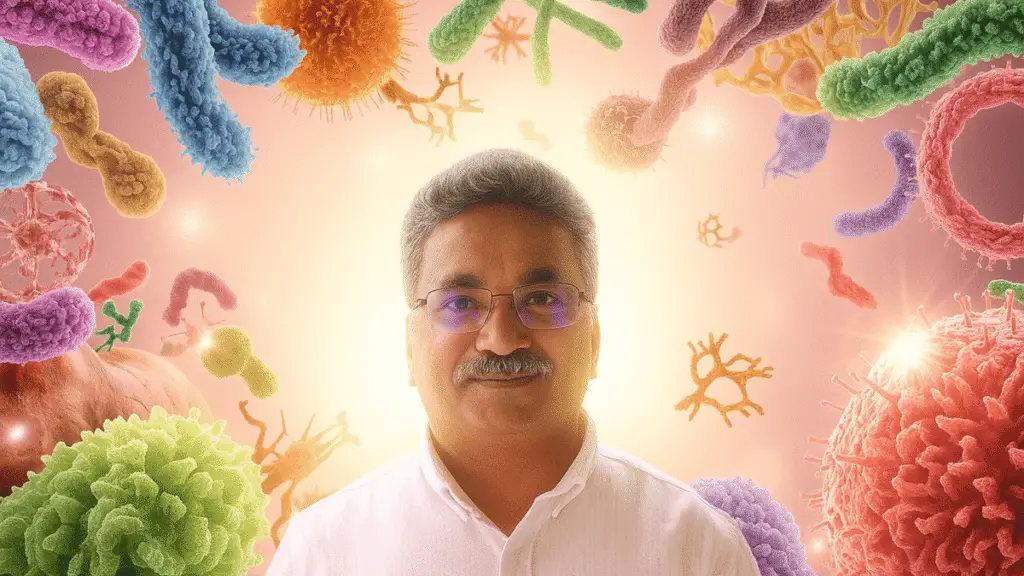Genes influence our behavior, a connection that science now clearly supports. Genes are also involved in neural development, synaptic activities and signal transduction pathways.
But long ago, this Indian scientist established the connection between behavior and genetics in 1976. His classic paper is still a pivotal reference in neurogenetics.
This is the story of India’s leading and pioneering neurogeneticist, Dr. Obaid Siddiqi and his most important research paper in the history of neuroscience, behavior and neurogenetics.
Related article: Is Behavior Genetic? Let’s findout.
Key Topics:
Meet the Scientist:
Born in 1932, in a small town in Uttar Pradesh, India, to a postdoctoral fellow at the University of Pennsylvania, USA, Dr. Obaid Siddiqi’s academic journey was an inspiration to millions of peers.
He completed his PhD from the University of Glasgow and a postdoc at Cold Spring Harbor Laboratory and from the University of Pennsylvania.
Later on, he established some of India’s prestigious national research institutes, including the molecular biology department at the TATA Institute of Fundamental Research (TIFR) in 1962, the National Centre for Biological Sciences, Bangalore, India, and the Indian Academy of Sciences.
Interestingly, the celebrity scientist of that era, Dr. Homi Bhabha, personally invited Dr. Obaid Siddiqi to establish a molecular biology department at TIFR. He won numerous national and international awards and honors, including the prestigious Bhatnagar Award in 1976 and Padma Bhusan in 1984.

Research that established the neurogenetics foundation:
“Not everyone is doing pathbreaking research; everyone is going deeper and deeper in one topic.” -Dr. Obaid Siddiqi.
Dr. Obaid Siddiqi believed in constantly exploring new paths. He began his academic journey as a botanist at Aligarh Muslim University, went on to establish the Molecular Biology Unit at TIFR, and made remarkable contributions to behavior genetics and neuroscience. His career reflected an exceptional range of curiosity and a mindset that never settled for just one field.
He proved his excellence and expertise when he published a groundbreaking research article, entitled “Neurophysiological defects in temperature-sensitive paralytic mutants of Drosophila melanogaster.”
Co-authored by Seymour Benzer, the present research revealed fascinating insights into behavior and neurogenetics, which were entirely new in the 80s.
The nervous system’s functioning is regulated by genetics:
The present research is a classic example of how a simple experiment can unfold complex universal concepts. Here is what Dr. Obaid Siddiqi and team did.
They chose three different mutant Drosophila flies and subjected them to heat treatment to observe the paralysis and recovery.
- They raised flies at different temperatures
- Performed heating and cooling experiments
- Observed paralysis and recovery time and temperature
- Observed and recorded neurophysiological activities for nerves, muscles and synapses
- Finally, recorded the behavioral cause (nerve, muscle or synaptic) and temperature.
The outcomes revealed something never reported:
The outcomes of the present research were indeed pathbreaking. Different mutants have different causes for paralysis. Meaning, different gene variants have a substantial effect on behavior and neural functioning.
By doing so, they have identified key genes involved in neural functioning. Thereby, the present research established a foundation for neuro- or behavior genetics globally. Later on, many subsequent studies based on this research changed how scientists study neuroscience and behavior.
The present study also laid the foundation for understanding the molecular mechanisms underlying sodium channels, vesicle cycling and neurotransmitter activities.
Related story: This Scholar Is Revealing Why Some Women Develop Diabetes During Pregnancy.
Inspiration for millions:
It’s hard to believe! A botanist, originally interested in developing disease-resistant wheat, established cutting-edge (state-of-the-art) research facilities in the field of molecular biology.
That’s only due to Dr. Obaid Siddiqi’s bold, straightforward and courageous nature and intellectual understanding.
One incident of his extreme courage and risk-taking ability was with Guido Pontecorvo, who invited Dr. Obaid Siddiqi to pursue a PhD under his supervision. Pontocorvo’s condition was to pass one small test; only then could he join him.
When Dr. Siddiqi arrived at the University of Glasgow, Pontocorvo asked him to join the lab and begin experimentation. He revealed that the test was only to see whether he was willing and prepared to travel to Glasgow.
Dr. Obaid Siddiqi’s achievements and success are a classic example of determination, self-belief and skill-building, showing no era can be a limitation for science.
His journey shows that starting small, as a botany lecturer at AMU, can lead to achievements admired around the world.
Dr. Obaid Siddiqi was not only a visionary scientist but also a social worker and activist. His extreme leftist ideology led him to imprisonment in 1949 for a social protest.
Key finding of Dr. Obaid Siddiqi:
Dr. Obaid Siddiqi worked in many fields, including botany, fungal, bacterial, neuro, and behavioral genetics.
Besides his contributions to neurogenetics, his discovery of genes that trigger taste and smell was also a groundbreaking milestone in scientific exploration! Here is a small summary and a list of his findings and contributions to science.
He discovered,
- Genes involved in neural functioning.
- Genes involved in behavior and neurofunctioning.
- Genes trigger taste and smell
- A nonsense, stop codon in collaboration with Alan Garel.
- A unique negative interference during crossing over.
- Genetic suppression in bacteria.
Related story: Do Yogurt and Hawaijar Always Benefit Our Gut? A Scientist Just Questioned What We Believe.
Wrapping up:
Dr. Obaid Siddiqi was an underrated yet a hidden gem of the Indian scientific community. He worked with the world’s prestigious organizations and scientists.
He worked with Seymour Benzer, father of modern neurogeneticist Alan Galen, a renowned molecular biologist at Yale, Arthur Koneburg, who discovered DNA polymerase and Guido Pontocorvo, another famous scientist.
He also collaborated with Indian scientists Govind Swarup, Verghese Kurien, Vijay Raghavan, etc, during his research tenure.
His contribution to the Indian scientific community was abundant and valuable, without which India could not have grown in molecular biology. Dr. Obaid Siddiqi died in 2013 in a road accident at the age of 81. We are thankful to Dr. Obaid Siddiqi for their contribution to science.
Resources:
O. Siddiqi, & S. Benzer, Neurophysiological defects in temperature-sensitive paralytic mutants of Drosophila melanogaster., Proc. Natl. Acad. Sci. U.S.A. 73 (9) 3253-3257, https://doi.org/10.1073/pnas.73.9.3253 (1976).
India mourns the loss of aristocratic and gutsy molecular biology guru by Nature India.


